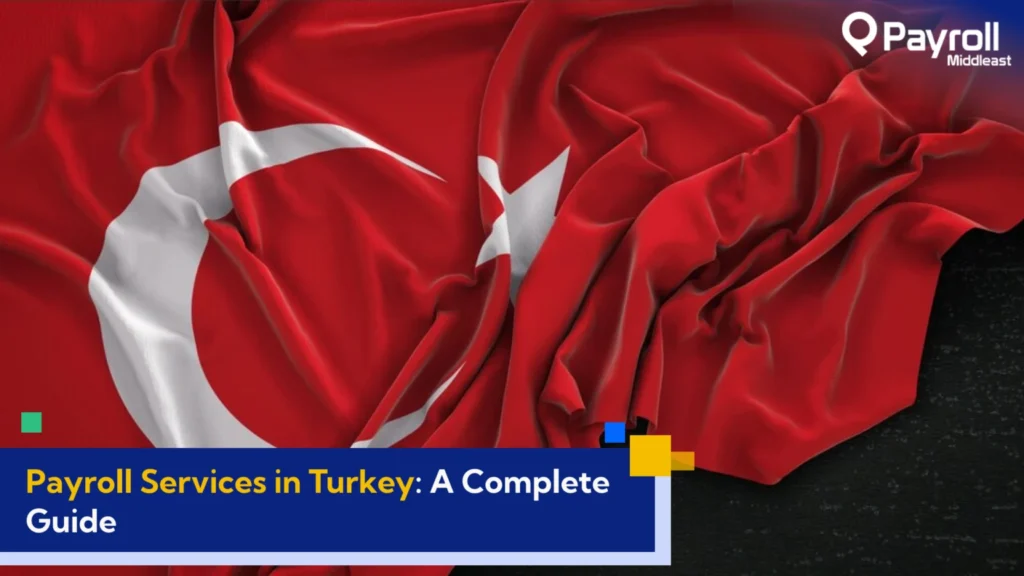Running a successful business demands more than a foolproof strategy. Even the smartest entrepreneurs can find themselves dealing with the complexities of daily operations. Payroll, a critical and time-consuming function, often becomes a problem. To navigate these complexities efficiently and effectively, outsourcing payroll services in Turkey presents a compelling solution. Businesses can significantly ease operational burdens by delegating payroll management to a specialized team of experts, allowing for a laser-like focus on core capabilities and strategic growth initiatives.
Moreover, outsourcing ensures faithfulness to Turkey’s involved labor laws, justifying the risk of costly errors and penalties. This strategic approach not only frees up valuable time and resources but also enhances overall business efficiency and profitability.
Understanding Turkish Payroll
In Turkey, managing a company requires navigating a sophisticated payroll system. Normally, payments to employees are made on the last day of each month. In addition to salary payment, employers also bear the responsibility of making an extra 22.5% social security contribution on the employee’s behalf. Contributions to health, unemployment, pension and disability, and short-term insurance are included in this.
Benefits of Using Payroll Services in Turkey
The number of advantages the payroll services in Turkey bring is sure to step up your business. Relying on this service will lead you further in the success of your company. From the saving of time to the alignment with the laws, each factor is being considered carefully.
Compliance with Turkish Payroll Regulations
Payroll service providers can offer significant advantages in ensuring compliance:
- Payroll computations can be complex, and errors might result in fines and legal problems. Payroll services use technology and experience to reduce errors.
•Laws are subject to frequent change. Payroll services monitor changes and guarantee that your procedures adhere to the most recent regulations.
• Payroll services save you time and money by automating repetitive procedures like submitting taxes, social security contributions, and tax calculations.
• They can respond to your inquiries concerning Turkish labor laws and tax regulations and offer advice on complicated and common payroll issues.
Saves Time and Resources
Businesses in Turkey may find that using payroll services might save them time. Payroll outsourcing saves you time and money by allowing your team to concentrate on other projects while the service provider manages the nuances of Turkish payroll laws.
Access to Expertise and Technology
Turkish payroll service providers are professionals at negotiating the complexities of Turkish payroll laws. They make use of cutting-edge technology to guarantee precise computations, automate procedures, and expedite the whole process. You don’t have to worry about keeping up to date, minimizing mistakes, and optimizing efficiency thanks to our knowledge and technology.
Reduced Risk of Errors
In Turkey, payroll services serve as a safeguard for companies. Their knowledge and technological prowess reduce errors in intricate payroll computations, shielding your business from monetary fines and legal problems that may result from incorrect deductions, taxes, and social security contributions.
Types of Payroll Service Providers in Turkey
Top payroll service providers can be of different kinds based on the service they provide. This is further demonstrated into three kinds below.
Global Payroll Companies (GECs)
One of the most common categories of payroll service providers in Turkey are Global Payroll Companies (GECs). These are major, global corporations that provide payroll processing services in Turkey and other nations. They possess the know-how and assets necessary to manage the intricacies of payroll in many nations, including Turkey’s unique labor and tax regulations.
Local Payroll Service Providers
In the Turkish market, local payroll service providers represent a significant category of suppliers. These businesses focus on managing payroll for companies that operate in Turkey. They provide several benefits:
- Deep Local Knowledge: Local service providers are well-versed in the nuances of Turkish payroll laws, including minimum wage changes, social security contributions, and tax codes.
- Language and Cultural Awareness: Working with a local supplier who is familiar with Turkish business customs and can interact with government and employee groups efficiently will facilitate communication.
- Competitive Pricing: For smaller enterprises in particular, local providers may provide more affordable rates than GECs.
- Customization: They can frequently modify their offerings to satisfy the particular requirements of your business.
- Professional Employer Organizations (PEOs)
PEOs in Turkey do more than just handle payroll. They take on the role of a co-employer, managing all aspects such as social security and tax filings and making sure all rules are followed. This protects your company from fines and legal ramifications that may result from payroll errors, allowing you to concentrate on your core competencies.
How to Choose the Right Payroll Service Provider
Choosing the right payroll companies in Turkey is highly crucial as many companies are offering payroll services. To know whether their services are fulfilling the requirements of your company is significant. Consider the following factors when selecting the right payroll services provider.
Company size and complexity
The size and complexity of your Turkish business will determine which payroll service provider is best for you.
Big, multinational businesses: Because of their proficiency in managing a variety of legislation and the provision of standardized procedures, a Global Payroll Company (GEC) may be the best choice for enterprises with large international activities.
Small and medium-sized enterprises: Local suppliers might be a great option because of their thorough knowledge of Turkish laws, affordable prices, and capacity to tailor services to your unique requirements.
Businesses looking for all-inclusive support: Professional Employer Organizations (PEOs) present a compelling choice for companies of all sizes that place a high priority on risk mitigation, compliance assurance, and less administrative load. Less control over some HR-related issues and maybe increased costs are the trade-offs.
Budget
Cost is an issue when choosing a payroll service provider in Turkey. How to choose the best option for your budget is as follows:
- Compare the varying rates that various companies are offering. Obtain quotations and evaluate base prices, employee-by-employee costs, and any other expenses for features you require.
- Never choose the least expensive choice. Consider the intricacy of your payroll as well as the features you would like to have (such as accounting software integrations, etc.).
- Cost is crucial, but in the long term, you can save money by avoiding mistakes and penalties if you work with a trustworthy source that has experience with Turkish payroll.
Experience with Turkish payroll
Opting for seasoned payroll services in Turkey offers numerous advantages. Turkish labor and tax laws are intricate. Experienced providers possess in-depth knowledge to ensure compliance and avoid costly penalties. They have streamlined processes and robust systems to deliver accurate payroll calculations and timely payments. Moreover, their expertise helps identify potential risks and implement preventive measures to safeguard your business.
Furthermore, by outsourcing payroll, you free up valuable time for core business activities. They often offer competitive pricing and cost-saving strategies. Adapting to your business’s growth, they handle increasing payroll complexities. Many providers utilize advanced software for efficient payroll processing and data management.
Services offered (e.g., tax filing, expat support)
A whole range of services are offered by payroll providers in Turkey to handle employee benefits and legal compliance. These are a few of the primary duties:
- Payroll processing is the precise and prompt computation of net pay, bonuses, and deductions.
- Managing social security contributions, income taxes, and other applicable taxes is known as tax compliance.
- Benefits administration is the management of benefits provided to employees, including paid time off, health insurance, and pension payments.
- Expert services for overseas workers that include tax ramifications, currency conversions, and adherence to immigration laws.
- Payroll reporting involves producing a range of reports for employees, government agencies, and management.
- Help with HR-related duties including tracking leaves, managing contracts, and managing personnel data.
- Monitoring compliance with labor laws, rules, and industry standards is known as compliance management.
- Managing year-end activities such as tax reconciliations, bonus computations, and yearly reporting.
Payroll Process in Turkey
Turkey’s complex labor rules and tax restrictions make it difficult to navigate the payroll procedure there. To maintain compliance and avoid penalties, businesses operating in Turkey are required to follow certain standards and processes.
Pay Schedule and Minimum Wage
Employees in Turkey are usually paid once a month. The exact day of the month that salaries are paid out is decided by the firm. At the moment, the minimum wage is 17,002.50 Turkish Lira per month. Legally speaking, extra payments such as the 13th or 14th month’s wage are not required.
Calculation and Withholdings
To determine an employee’s net pay, payroll in Turkey entails deducting required deductions from their gross compensation. Here’s an abridged summary: Before deductions, gross salary is the total of base pay, bonuses, overtime pay, and any other forms of compensation. The employee receives their gross salary, which is then reduced by taxes and social security contributions to determine their net salary. Employers and employees each contribute a portion of the gross wage (less certain allowances) to Social Security (SSI). The income tax is based on the net wage of the employee, The computation is made on a progressive scale for Stamp Tax. A tiny tax is added to the gross pay by the employer. Employers and employees each make a tiny contribution toward unemployment insurance.
Employer Responsibilities
Employers in Turkey are in charge of an intricate payroll procedure. This involves following a pay cycle that runs every month, usually ending on the final day of the month. Companies are required to make social security contributions, in addition to paying salaries, totaling 22.5% for each employee’s earnings. This contribution is divided into four categories:
- general health insurance (7.5%),
- unemployment insurance (2%),
- pension and disability (11%), and
- short-term insurance (2%).
Why are we the best choice for you?
Payroll Middle East is a platform that provides the list of top payroll service providers in Turkey. We are proficient in eliminating turkey payroll issues and keeping your business affairs streamlined. The company’s services cover everything you are looking for. Get in touch now and start your payroll now!
FAQs:
How can payroll outsourcing ensure compliance in Turkey?
Outsourcing uses local professional expertise to implement complicated laws and income tax legislation, and lowers the risk of legal sanctions.
What are the most significant elements of payroll in Turkey?
Main elements include gross salary, income tax, and stamp tax, all subject to legislative minimums.
How is taxable income computed on employee pay in Turkey?
Revenue tax is determined using a variable tax scale based on yearly income in Turkey.
What do payroll services do in Turkey?
They deal with monthly chores, such as paychecks, deductions, income tax declarations, and ensuring conformity with Turkish labor law.
What are some of the regular issues that firms in Turkey have with payroll?
Obstacles include interpreting complex declarations, handling income tax load, and regular rules adjustments with mandatory wage changes.
How often does Turkey process payroll?
Most of the time, payroll is processed once a month. All tax returns and social security payments that go along with them must be filed and paid by certain monthly dates.






